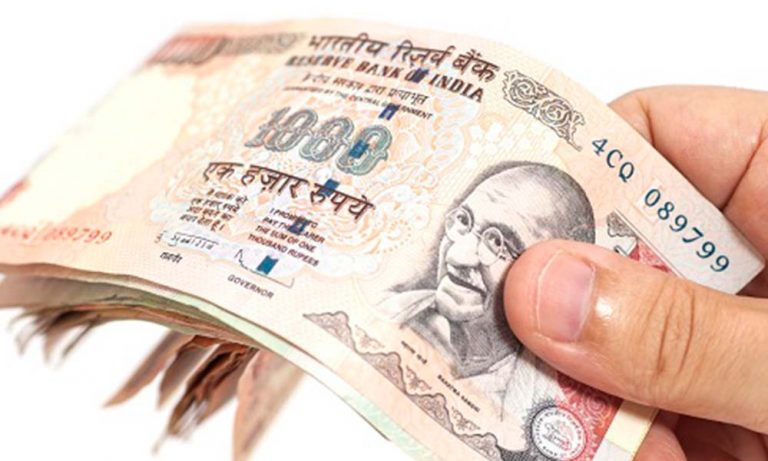
2016-11-19, RSS
When India Prime Minister Narendra Modi withdrew the legal tender of Indian 500 and 1,000 rupee banknotes on November 8, it was meant to curb ‘black money’ and corruption, but the move itself has ironically created a new black market — illegal exchange of those notes held in Nepal.
The logic behind the Modi’s move was that as people exchanging them at authorized bank outlets would have to furnish satisfactory source of earnings and other details, the people who made money through corruption and other illegal ways would be the only ones left standing with the notes. However, India has not yet said if people outside the country who can prove the 500 and 1,000-rupee Indian banknotes they have in their possession were accumulated through legally-recognized means would be provided the same legal exchange facility as those in India at a later date.
This has caused Nepalis with demonetized Indian 500 and 1,000 rupee banknotes to be hyper-anxious, and afraid that the Reserve Bank of India (RBI) might not honor the promise it made in its notes. Those not wanting to run the risk that the banknotes they have will end up not being worth the material they’re printed on, they are accepting much lower rates for those notes offered in the black market.
IRs 500 should fetch Rs 800 in Nepali currency, according to the official exchange rate fixed by Nepal Rastra Bank (NRB). However, black marketers are offering to buy Indian banknotes of 500 and 1,000-rupee denominations at a 1:1 rate, i.e. Rs 500 Nepali for Rs 500 Indian.
The black marketers, who also hold bank accounts in India, accept such demonetized currency and take it to India for exchange.
Some of the members at Nepal Investors Forum’s WhatsApp are offering the exchange facility in the group messages. Three messages that Republica reviewed showed these members saying that they would accept any sum of such demonetized Indian banknotes.
Considering the ban that the NRB imposed on exchange of 1,000 and 500 Indian rupee bills last Wednesday, such transactions are illegal.
“Anyone want to change 500 or 1,000? Will give Rs 500 NC for IRs 500,” reads one of the messages of a member at of the WhatsApp group.
Arjun Thapa, who runs a garment shop in Sundhara, told Republica that he, as well as many other traders that he know, have sold Indian currencies of 1,000 and 500 denominations as there was still uncertainty over the fate of such notes. “Many traders have sold the stocks of Indian currencies suffering huge loss. There are some who are still holding the demonetized Indian banknotes with the hope that the government would eventually provide them some way out,” Thapa added.
According to Thapa, most of the shops around Sundhara area accept Indian currency from Indian tourists who come to buy cheaper Chinese garments, shoes and other electronic appliances. He told Republica that he knows some traders who have bank accounts in India and buy India currency at cheaper rate.
The illegal exchange of Indian currency is also becoming rampant in the bordering districts like Parsa, Banke, Nawalparasi, Kanchanpur and Rupandehi, among other districts, according to Republica’s district correspondents.
Earlier on Monday, Indian daily Times of India reported that 1,000 banknotes were being exchanged for 600 in Nepali currency in Raxaul.
Federation of Nepalese Chambers of Commerce and Industries (FNCCI) President Pashupati Murarka told Republica that they have heard that some businesspersons in border areas have exchanged demonetized banknotes at lower rates. “There are fears among people that the Indian banknotes in their possession would not be exchanged. So, some of them have exchanged such banknotes with the help of their relatives in the other side of the border at 5 to 10 percent lower rates,” Murarka told Republica. “But such cases are very few.”
The illegal exchange of Indian banknotes is likely to make Indian government further suspicious, say observers. The Indian government seems to be reluctant to exchange the Indian banknotes held by Nepalis as it is concerned that black money could reach Indian again through Nepal.
NRB officials also do not rule out illegal exchange of Indian banknotes.
“We have also heard about such transactions. So, we have issued instruction to our regional offices to keep vigil over such transactions and take needful legal action in coordination with the local administration,” Bhisma Raj Dhungana, executive director at the Foreign Exchange Department of the NRB, told Republica.
“However, we have not received any complaint or evidence of such transactions yet. Since Indian banknotes of 1,000 and 500 denominations have been withdrawn from financial system, they cannot be used for any transactions. We have already issued ban on exchange of such notes,” he added.
Dhungana also appealed to the public to not rush to exchange the Indian banknotes in their possession as the two governments have held highest-level talks to resolve the issue.
Though the Indian government has formed a committee to look into the issue of demonetized Indian banknotes that Nepal and Bhutan hold, it is still unsure whether the public will be provided exchange facility for Indian currency that they possess legally.
According to the central bank, nearly 33.6 million worth of Indian rupee bills of 1,000 and 500 bills are in the banking channel. However, there is no exact figure about such banknotes in possession of traders, families of migrant workers in India and general public.
FNCCI President Murarka estimates that there could be nearly Rs 10 billion worth of Indian currency outside the banking channel.





